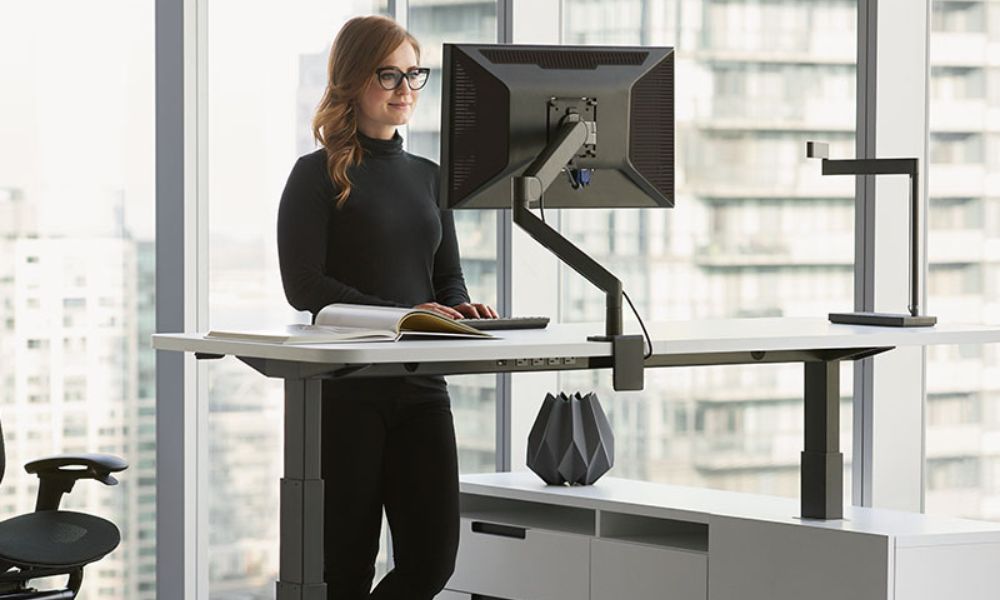In today’s fast-paced work environment, maintaining productivity and well-being can be challenging. Many of us spend long hours seated at our desks, which can lead to a range of health issues and decreased energy levels. Fortunately, there’s a simple yet effective solution: asking for a standing desk at work. A standing desk allows you to alternate between sitting and standing throughout the day, promoting better posture, increased energy levels, and a reduced risk of health problems associated with prolonged sitting.
This article will delve into the numerous benefits of using a standing desk, explore how it can boost your productivity and well-being, and provide practical tips on how to successfully request one for your workspace.
Benefits of Standing Desks
Standing desks offer a multitude of advantages that extend beyond simply changing your position throughout the day. They contribute to a healthier work environment and can significantly improve both your physical and mental well-being.
Increased Energy Levels
One of the most noticeable benefits of using a standing desk is an increase in energy levels. When you stand, your muscles are more engaged, which improves blood circulation and boosts your metabolism. This increased activity can help combat that afternoon slump and keep you feeling alert and focused throughout the workday.
Improved Mood and Focus
Studies have shown that standing desks can positively impact mood and concentration. Standing promotes better posture, which can lead to a sense of confidence and alertness. Additionally, the increased blood flow and oxygen delivery to the brain can enhance cognitive function and improve your ability to focus on tasks.
Productivity Boost
While it may seem counterintuitive, asking for a standing desk at work can actually lead to a significant boost in productivity. The improved energy levels, focus, and reduced fatigue associated with standing desks allow you to work more efficiently and accomplish more throughout the day.
Enhanced Creativity
Standing desks can also foster creativity. The change in posture and environment can stimulate new ideas and perspectives. When you’re not confined to a seated position, your mind is free to wander and explore different solutions, leading to more innovative thinking.
Reduced Distractions
Standing desks can help minimize distractions by encouraging movement. When you stand, you’re less likely to get caught up in mindless scrolling or other distractions that can derail your workflow. The physical act of standing keeps you engaged and focused on the task at hand.
Improved Well-being
Beyond productivity gains, asking for a standing desk at work is a powerful investment in your overall well-being. It promotes healthier habits and reduces the risk of developing chronic health issues associated with prolonged sitting.
Reduced Risk of Chronic Diseases
Sitting for extended periods has been linked to an increased risk of heart disease, type 2 diabetes, obesity, and certain types of cancer. Standing desks help mitigate these risks by promoting movement and improving blood circulation. Even small changes in posture throughout the day can make a significant difference in your long-term health.
Improved Sleep Quality
Regular physical activity, even in small increments like standing at work, can contribute to better sleep quality. When you’re more active during the day, your body naturally tires out at night, making it easier to fall asleep and stay asleep.
Posture and Health
Maintaining good posture is crucial for overall health and well-being. Asking for a standing desk at work can significantly improve your posture by encouraging you to stand up straight and engage your core muscles.
Reduced Back Pain
Prolonged sitting often leads to muscle imbalances and strain on the back, resulting in pain and discomfort. Standing desks help alleviate this by promoting better spinal alignment and reducing pressure on the lower back.
Requesting a Standing Desk
Making the switch to a standing desk can be easier than you think. Here are some tips on how to successfully request one for your workspace:
Prepare Your Case
Gather information about the benefits of standing desks, such as increased productivity, improved well-being, and reduced health risks. Highlight how a standing desk could specifically benefit your work performance and contribute to a healthier work environment.
Speak to Your Manager
Schedule a meeting with your manager to discuss your request. Present your case clearly and professionally, emphasizing the positive impact a standing desk could have on both you and the company. Be prepared to answer any questions they may have about cost, implementation, or potential challenges.
Explore Company Policies
Check if your company has any existing policies regarding ergonomic equipment or flexible work arrangements. Familiarize yourself with these policies to ensure your request aligns with company guidelines.
Conclusion
Asking for a standing desk at work is a proactive step towards improving your productivity, well-being, and overall health. By embracing this simple change, you can create a more dynamic and supportive work environment that fosters both physical and mental well-being. Remember to advocate for your needs, present a well-reasoned case, and explore available resources within your company to make the transition to a standing desk as seamless as possible.



